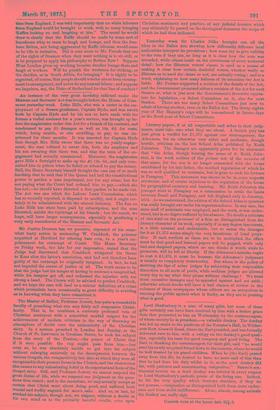An instance of the very great hardship inflicted under the
Masters and Servants' Act was brought before the House of Com- mons yesterday week. Luke Hills, who was a carter in the em- ployment of a Sussex gentleman, Captain Hyde, and was sworn both by Captain Hyde and by his son to have made with the former a verbal contract for a year's service, was brought up be- fore the magistrates under this Act for a breach of his contract, and condemned to pay 15 damages as well as 18s. 6d. for costs, which, being unable, or else unwilling, to pay, he was im- prisoned for three months. It was asserted for Captain Hyde that though Mrs. Hills swore that there was no yearly engage- ment, the man refused to swear this, both the employer and his son swearing that there was, and that the term of the en- gagement had actually commenced. Moreover, the magistrates gave Hills a fortnight to make up the £5 18s. 6d., and only com- mitted him to prison when he failed or refused to pay the money. Still, the Home Secretary himself thought the case one of so much hardship that he said that if the Queen had had the constitutional power to pardon a man imprisoned, not for any crime, but for not paying what the Court had ordered him to pay,—which she has not,—he should have directed a free pardon to be made out. The Act was one which the Labour Laws' Commission, which 'has so recently reported, is disposed to modify, and it ought cer- tainly to be administered with the utmost leniency. The fine on Luke Hills has since been paid by subscription, and the man liberated, amidst the rejoicings of his friends ; but the result, we hope, will have larger consequences, especially in producing a 'very early amendment of the Masters and Servants' Act.


































 Previous page
Previous page